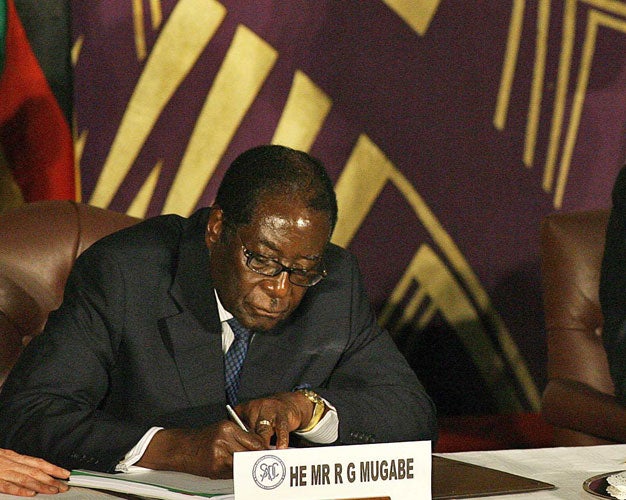Mugabe: Signing coalition deal was humiliating

Your support helps us to tell the story
From reproductive rights to climate change to Big Tech, The Independent is on the ground when the story is developing. Whether it's investigating the financials of Elon Musk's pro-Trump PAC or producing our latest documentary, 'The A Word', which shines a light on the American women fighting for reproductive rights, we know how important it is to parse out the facts from the messaging.
At such a critical moment in US history, we need reporters on the ground. Your donation allows us to keep sending journalists to speak to both sides of the story.
The Independent is trusted by Americans across the entire political spectrum. And unlike many other quality news outlets, we choose not to lock Americans out of our reporting and analysis with paywalls. We believe quality journalism should be available to everyone, paid for by those who can afford it.
Your support makes all the difference.Zimbabwe's fragile power- sharing government was already foundering yesterday, after President Robert Mugabe refused to agree on the make-up of the cabinet and openly referred to working with the former opposition as a "humiliation" for his party.
Fears that the 84-year-old autocrat would sabotage the new set-up by refusing to yield authority to his supposed partners, were quickly vindicated yesterday as the deadline forappointing 31 ministers came and went with no agreement.
A meeting between the President and his Prime Minister and rival Morgan Tsvangirai failed to deliver, after the older man insisted on keeping the powerful security portfolios to himself.
Mr Tsvangirai has refused to budge on his insistence on getting at least one security ministry – Home Affairs, which has been earmarked for his popular deputy, Tendai Biti. The ministry has authority over the police force, which in recent years has been used to terrorise supporters of Mr Tsvangirai's Movement for Democratic Change.
The MDC spokesman Nelson Chamisa said the deadlock on this first serious piece of business for the new administration would see it bounced back to the negotiating teams that laid out the power-sharing deal, signed with much fanfare on Monday.
Mr Mugabe had earlier described the power-sharing arrangement as a "humiliation" when he addressed a central committee meeting of his Zanu-PF party. The failure to reach consensus on the cabinet, and Mr Mugabe's own remarks, are more evidence that the whole power-sharing deal could be unworkable, despite the interest it has generated in Zimbabwe and internationally.
Under the agreement, Mr Tsvangirai will become Prime Minister and chair a council of ministers supervising the cabinet. His party is expected to get 13 cabinet posts, with Arthur Mutambara's breakaway MDC faction likely to control an additional three ministries. Mr Mugabe's party, which lost control of parliament in the March election for the first time in 28 years, is likely to have 15 ministers in the cabinet.
"If only we had not blundered in the March elections, we would not be facing this humiliation," said Mr Mugabe, speaking mostly in the local Shona language. "But because we fought the March elections divided and lost, this is what we now have to deal with."
However, the veteran president assured his supporters that he would still be in the "driving seat" under the new set-up. And in a clear sign that he is merely using the power-sharing deal to win space, he urged his supporters to use the opportunity it has created to regroup and prepare for seizing power in future elections. "We are still in a dominant position which will enable us to gather more strength as we move. We remain in the driving seat," he added while also emphasising what his party must now do to extricate itself from the power-sharing arrangement in future. "If we are to save ourselves from this predicament, we need to re-organise, revive and truly restructure the party from the grassroots."
The fresh delay came amid a mounting food crisis; no Zimbabweans want the power-sharing deal to fail if it can bring relief to the country's long-suffering masses. But doubts linger among many about whether it can last and whether Mugabe is serious about it. And it seems doubtful that Mr Mugabe will leave Mr Tsvangirai enough leeway to implement the drasticpolicy changes needed to resuscitate the collapsed economy.
The President's address at the signing ceremony earlier in the week contained nothing about his vision for the country, instead he revived his anti-colonial rhetoric.
Join our commenting forum
Join thought-provoking conversations, follow other Independent readers and see their replies
Comments